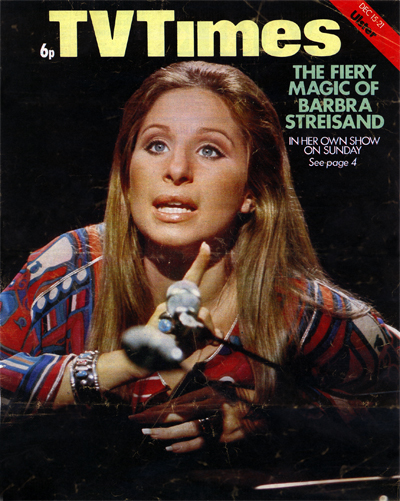 TV Times
TV Times
December 13, 1973 (U.K.)
Words by Peter Genower; Pictures by Bert Hill
Barbra Streisand spent 10 days at Elstree Studios perfecting her hour-long show to be seen on Sunday. This is the story of two of those fiery, magical days
THE NOSE, eyes, mouth . . . everything about Barbra Streisand is larger than life. Her capacity for work is unlimited, her skill enormous. She spent two weeks recording her one-hour special for ITV at Elstree Studios, dominating the set throughout exhausting 11-hour days—laughing, sulking, blowing kisses.
The show, in which Streisand appears for the complete hour, has one guest star, the blind American, Ray Charles, and a confection of musical accompaniments which span the world of sound from Irish bagpipes, through African elephant horns, to burbling washing machines and electric doorbells.
A closed set was imposed at the studios, and only a handful of photographers allowed. She would give no interviews—“Barbra is a very private person,” explained a press aide.
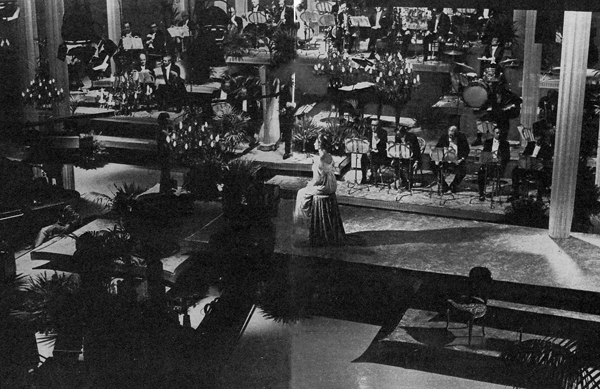
For five hours one afternoon, she and Ray Charles sang one of Charles's own compositions, the doleful Cryin' Time. They went through it 12 times before they got it perfect, because anything less than perfect was not good enough for Miss Streisand, or for the show's tenacious director and co-producer, Dwight Hemion. An eyelid batted out of place, and they sang it again. Both were striving to gain perfection.
Charles sat coolly behind the piano, a tight-figured, little man in black suit, waiting patiently for the signal to begin, at which point he sprang to life on the keyboard as if someone had plugged him in. “Every time I do this song it comes out different,” said Charles. “I never sing it the same way twice.”
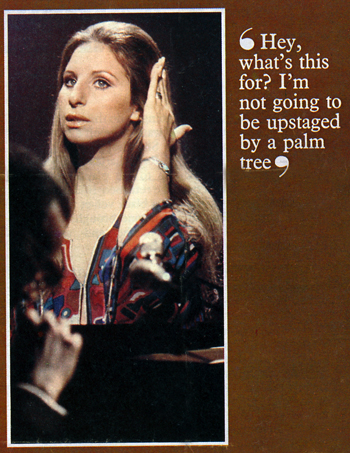 Streisand, in flowing multi-coloured dress, her long brown hair reaching right down her back, wound that rubbery mouth around the words, effortlessly producing the purest notes.
Streisand, in flowing multi-coloured dress, her long brown hair reaching right down her back, wound that rubbery mouth around the words, effortlessly producing the purest notes.
In between shots, Shirley the make-up girl powdered the Nose, Streisand chewed gum, and Charles sucked a cigarette. “Am I crazy or isn't that a great shot ?” said Streisand, looking at a playback of her own performance. Director Dwight Hemion, his voice booming through the studio from the control room above, wasn't impressed: “We can do better than that, sweetheart.”
The auditorium was empty save for Streisand's six-year-old son Jason (by her marriage to actor Elliott Gould), who sat next to Barbra's dresser, Gracie Davidson, drawing pictures on a scrap-pad. An alert, impish-looking boy, long-haired, in blue T-shirt and jeans, he looked a little bored with the proceedings. On the set nothing seemed be going right. Streisand sat by the piano as a camera closed in on her face. “Look,” she said, “if you close in on my nose I look cross-eyed. If you close in on my eyes my nose looks too big.”
When they tried a different close-up, she still wasn't satisfied. “How many times do I have to say it ... that camera is nearly in my teeth!”
The day ground on. When, at last, Hemion and Streisand declared themselves happy with Cryin' Time, everybody was nearly in tears anyway. But there was no relief ... it was straight on to another number—Barbra singing Sweet Inspiration, with Ray Charles playing the organ.
Streisand took an immediate dislike to one of the props. “Hey, what's this ?” she said, pointing to a large leafy plant which was hogging the camera shot. “I'm not going to be upstaged by a palm tree.”
By late afternoon, nerves were beginning to split at the ends. Barbra sat on the set looking bored while the lighting technicians struggled to get the spotlights positioned.
“I'm not going to have what happened the other night,” she said, “having to do a complicated song at five to eight.”
There was an anxious pause—you could feel the tension bubbling up. “Come
on, Dwight,” she snapped, walking off the set looking very irritated.
“Just a minute, Barbra,” called Hemion.
“What?” she shouted.
“Oh, forget it, Barbra.”
“Just when you're on to something you want me to forget it ?”
“Well, you look tired, Barbra.”
“I am tired. Either you're going to do this or you're not. I want to go off and change.”
She disappeared.
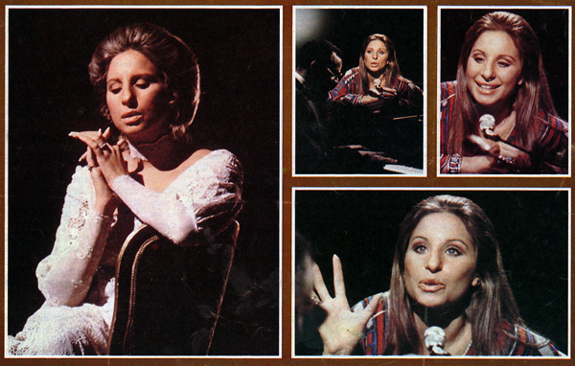
Ray Charles was being led up to the piano stool when she returned 10 minutes later in a black velvet trouser-suit. Someone brought her a cup of coffee and a battery-operated fan. Everything seemed to have cooled off. Or had it ?
Dwight Hemion's voice: “Barb, I don't like the dress.”
“What's wrong with it ?”
“It looks like a rehearsal costume.”
“Well I like it. What's wrong? Too tight?”
“Take a look at yourself on the monitor. If you like it, we'll stay with it.”
A moment's thought, and she tramped back to the dressing-room, returning
quickly in an off-white satin trouser-suit.
Every moment, Streisand's mind seemed to be working on new ideas, new shots.
“Hey, Dwight,” she said. “This song is a hot number. The set looks cold. I want the sort of smoky feeling you get in a club. Why don't you shoot into a light ?”
Then her mind switched back to her costume. “A big decision. Shall I wear the jacket closed or open? If I have it closed I'll wear a white choker because I won't be showing the shirt.”
She left it open, but then a long discussion followed about camera angles for
Sweet Inspiration. Again Streisand and Hemion disagreed. In the end, she retorted in curt, twangy Brooklyn: “Dwight, YOU are going to have to adjust to me. I am not going to adjust to you. I'm NOT going to screw up my whole performance over this.”
Next Hemion wanted her to wear a diamond ring, so that the camera could pick up the sparkle. “I don't have one,” she said abruptly. “I'm known for my plainness.”
Minutes later, relaxed again, she stuck her teeth into a large chocolate cake. As usual during the day, a box of assorted cakes was sent into the studio for her to choose from.
In the auditorium, Jason was licking a cream cornet, taken from the box.
“Isn't that good, J.J. ?” Streisand shouted up to him. “You sleepy, honey? We're gonna go home soon.”
She must have been joking. By eight o'clock, when they tackled Sweet Inspiration for
the 12th time, things were looking decidedly sour. But, at last, the star and the
director pronounced themselves satisfied. Ray Charles, sensing the relief around the studio, played a few bars of Jingle Bells on the organ. By nine o'clock, Streisand was being ferried back into central London, to the house she was renting for her stay.
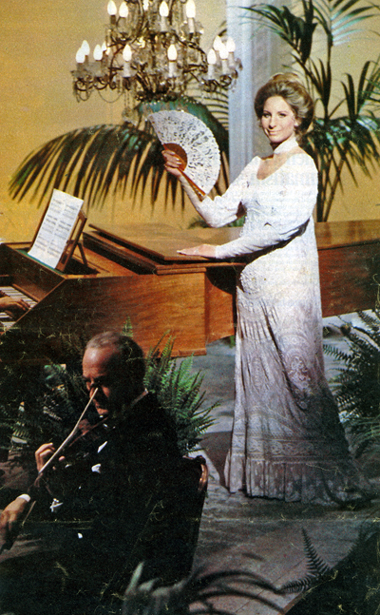 “I don't know how she does it,” said Gracie the dresser. “She's worked the whole day, and when we get back I just close the door and say goodnight. But she's on the telephone, phoning home for hours. She only gets five hours sleep.”
“I don't know how she does it,” said Gracie the dresser. “She's worked the whole day, and when we get back I just close the door and say goodnight. But she's on the telephone, phoning home for hours. She only gets five hours sleep.”
On the final recording day the show was almost complete. But the last number promised to be the most difficult of all. The show, Barbra Streisand And Other Musical Instruments, had so far included every instrument except the kitchen sink. Now it was the turn of the kitchen sink.
Jason was bouncing up and down in the auditorium as Streisand appeared, chewing gum, hair in a tight bun, wearing a white lace, ankle-length dress and black embroidered shawl. There was a good friendly feeling about as she inspected the rows of appliances and chatted to the engineers. She addressed the director through her mike: “I'm going to be nice to you today, Dwight.”
Then began again the tedious rehearsing and recording. Once the washing machine didn't spin properly. Then the kettle didn't whistle, or the electric toaster didn't pop up on cue. It was to be another long day.
At lunchtime, Streisand ate in the canteen, taking it easy with vegetable soup and smoked salmon. “She's been very good today,” said one of the canteen ladies. “She's supposed to be on a strict diet, you know. You should have seen her the other day. She fancied fish, so she had prawn cocktail, poached halibut, plaice off the bone, Dover sole and rice pudding. She eats like a horse.”
In the afternoon she was still full of life. “OK. Ready, get set, go!” she said, returning to the set, and everyone swung into Take 11. After Take 16 there was applause all round. That must have been good enough ?
“Good,” said Dwight Hemion from the control room. “But we can do better.” We had all heard it before.
At eight o'clock, after another 11 -hour day in the studios, after 23 attempts to sing the final number, the show was finally in the can.
But even after the show, Streisand didn't let go. She remained in Britain for a few days and, by arrangement with the few photographers who were allowed on the set, they sent her every transparency for her approval. She sat on the bed projecting each picture on to a screen, marking the ones she liked with the words "excellent", "terrific", "good", or "not bad", according to her taste.
Those pictures she didn't like, she kept.
It was just another example of how Barbra Streisand has become the world's top female singing star because of her determination to achieve perfection. Watch the programme on Sunday and decide for yourself whether all that aggro at Elstree was worth one hour of Streisand magic. The Secondhand Rose won't tolerate the second rate.
End.
[ top of page ]
